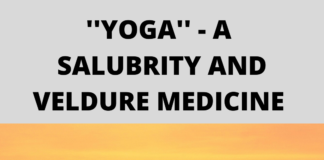The value of discipline in life is very great. Discipline is a factor in life, which makes for all progress, happiness and harmony. Without discipline no great achievements can ever be realized, nay, the very existence of humanity will be rendered impossible without discipline. Discipline is thus life, the absence of it is death.
The word discipline has very wide connotations. It relates not only to human conduct in relation to the fellow-beings,
but also to the entire constitution of the life as a whole. Discipline is the balancing of different elements in the make-up of human being and the society at large. When a man’s mind, heart and body are in proper co-ordination he behaves as a normal being, as a disciplined entity, but when these three are disturbed, abnormality begins. Whatever lawlessness and disorder we witness in human beings or in society ,it is the expression of the absence of correct balancing and functioning of these elements in the personality of the individual. Restraint is the life-blood of discipline. Restraint is another name for control exercised by our mind or reason over our different senses; when this control get relaxed, trouble begins. Reason or mind has been likened to a charioteer and the senses to horses. Our reason like a charioteer holds the reins of our senses and keep them in check and curbs their waywardness. This is the disciplined state of mind. But when reason gets subordinated to senses, disorder or indiscipline sets in. The former state , that is , the state of discipline, is always conductive to an individual’s own welfare as well as to the welfare of the community in which he lives. An undisciplined individual is a problem not only to the society in which he lives, moves and has his being, but also to himself. Hence, if discipline goes, our march towards destruction begins.
From this discussion it may appear that discipline is an individual concept only. Not so. Discipline is as much a social concept as an individual one, For our purpose there is hardly any difference between discipline and Plato’s justice in the ideal state of his ‘Republic’. According to Plato, social justice occurs when three orders of the society- the rulers, the defenders, the producers, representing reason , spirit and body respectively – are in proper harmony. They are in harmony when each of them perform the duties assigned to it and when there is least interference by any in any other’s sphere of duties. For peace in society, the proper co-ordination and harmony between these three elements in the society is essential.
The problem boils down to this that discipline is nothing but proper relationship of the members of the community with each other and with the community of which they are integral parts. In the society or human community there are several levels of relationships. There is relationship between the husband and the wife. Their proper and harmonious relationship is conjugal discipline. Proper and harmonious relation between different members of the family , makes for family discipline. Proper adjustment and harmony between different members of the society makes for social discipline. Within this broad sphere come group discipline, club discipline, party discipline, sports discipline, and even the gang discipline. Thus discipline is required everywhere. No human activity can take place in a normal way without discipline. At a different level, there are also other aspects of discipline. Thus there is moral discipline, intellectual discipline, economic discipline. Then there is discipline of the spheres. The whole universe is bound in a certain set discipline. There is an order and harmony between different celestial bodies. There will be total chaos if this set and settled, and orderly and harmonious relationship goes.
It thus become clear that discipline is the first requisite of society for its progress and well-being. Freedom is also essential for human progress. Discipline does not detract from freedom. On the contrary, it promotes and fosters it. On a deeper analysis it will be found that the freedom and discipline are synonymous, for freedom is as much as harmonious adjustment of different elements of an individual’s personality as discipline. At the social level also freedom means the proper adjustment and harmony between people and classes. In a society in which everybody’s hand is at everybody else’s neck, man’s life is nasty, brutish and short. Such a society is unfree. It may well be compared with ‘State of Nature’ of Thomas Hobbes’s ‘Leviathan’. Hobbes’s social contract infact is a contract of freedom and peace. Thus freedom needs restraint and discipline in order to be fruitful and meaningful. In other words, discipline is a necessary condition of freedom. if discipline goes , the disappearance of freedom is a natural corollary. The societies which can not maintain discipline can never be really free. Freedom as distinguished from license is a social concept. It entails concern for other people’s rights as for one’s own. Freedom rests on the premises; take care of duties, the rights will take care of themselves. In other words, true freedom consists in the faithful performance of one’s duties. Admitted that freedom presupposes the enjoyment of certain rights, but the source of rights is the duties. Rights emanate from duties. Performance of duties is discipline as we have already considered. In this way freedom and discipline are contributory rather than antagonistic to each other.
Indiscipline is fraught with many hazards, nay, it leads to final destruction and death. Progress of societies gets baulked when indiscipline in their rank sets in. Chaos and anarchy become the order of the day; fruitless and meaningless wars are fought leading humanity to misery, destruction and death. On the individual level, grave tragedies occur. Thus Shakespeare’s great tragedies are an account of human aberrations, of indiscipline besetting their characters. The fatal’ flaws’ in the character of the heroes, who are otherwise the very “glass and essence” of humanity, is a factor which sows the seeds of indiscipline in their moral constitutions. The result is their systematic downfall from greatness culminating in their exit from the existence. Napoleon went on winning victory after victory for himself and the country so long as he worked as a soldier dedicated to a great cause; but the moment he was caught up with an overweening personal ambition oblivious of the real interest of the State, he unmistakably set sail for his downfall. Hitler’s career is also an example almost identical to that of Napoleon.
Mussolini too licked the dust because of the same aberration on his part. These three potentates had lost the harmony of the basic constituents of personality. A sort of indiscipline had crept into their being. Aurangzeb laid the foundation of downfall of the Mughal empire by his religious intolerance and fanaticism. India had got enslave to foreign power because the people did not act and behave like in a disciplined way. Once that drawback was corrected, she could win back her freedom. The present story of affairs in our polity can be attributed to the lack of discipline on the part of individuals and the group of individuals. We have relegated ‘reason’ , the principal disciplining factor, to the background position and we have allowed ourselves to be gripped by selfishness, greed, fear, lust, jealousy and an overweening ambition. There is chaos in the social cognition. Our thinking and action have got derailed from the right course breeding forces inimical to balance and discipline.
All the elements of the human personality are required to be in proper adjustment and perfect co-ordination in order that the same traits characterize our body politic; a disciplined society alone can ensure the well-being not only of its individuals composing it, but also to itself. The break-up and disappearance of all empires, the downfall of great dynasties, the destruction of great kingdoms and States, all can be traced to one single factor ‘indiscipline’ , the loss of adjustment, harmony and balance, the failure of the great rectifying factor ‘reason’ at some stage or the other. If we wish to survive and progress as an individual or as a nation or as a world, we have no alternative but to discipline ourselves. We have to remember: Discipline or perish.










